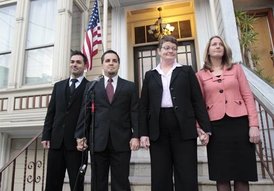California’s same-sex-marriage ban was back in court this week with the start of a much-anticipated trial to determine the constitutionality of Proposition 8, the first step in a fight that is expected to reach the U. S. Supreme Court.
The trial, the first ever in federal court on same-sex marriage, is a non-jury proceeding before U.S. District Judge Vaughn Walker, who will consider whether the state’s same-sex-marriage ban violates the U.S. Constitution’s equal-protection and due-process guarantees. Previous cases challenging marriage inequality were all dismissed before making it to trial.
The California Supreme Court initially overturned the state’s marriage-equality ban in May 2008 and same-sex marriages were legal in the Golden State until Nov. 4, when voters approved Prop. 8, which reinstated a constitutional ban on same-sex marriage, by a slim margin.
The suit was filed by two couples — Kristin Perry and Sandy Stier and Paul Katami and Jeff Zarrillo — in May 2009 after both attempted unsuccessfully to apply for marriage licenses. Named as defendants in the case are Gov. Arnold Schwarzenegger, Attorney General Jerry Brown and Department of Public Health officials.
Prior to the trial, Schwarzenegger filed a brief in which he refused to defend the constitutionality of Prop. 8, and Brown filed one in which he argued against its constitutionality. In their absence, several parties — such as the Alliance Defense Fund and representatives of Protect Marriage, the main proponent of Prop. 8 — have come on as defendant-intervenors to argue the case, and are tasked with demonstrating to the court that Prop. 8 serves a compelling government interest.
The trial is expected to last up to three weeks.
Shortly before the trial began Monday, the Supreme Court handed down a temporary order that prevented the live streaming of the proceedings on YouTube until at least Wednesday.
Attorney Theodore Olson, who is representing the plaintiffs alongside David Boies — his opponent in the landmark Bush v. Gore U.S. Supreme Court case in 2000 — delivered his opening statements Monday morning before the full courtroom in San Francisco.
“Proponents of Prop. 8 have insisted that the persons they would foreclose from the institution of marriage have suffered no harm because they have been given the opportunity to form something called a ‘domestic partnership.’ This is a cruel fiction,” Olson said, adding Prop. 8 “perpetrates irreparable, immeasurable, discriminatory harm for no good reason.”
“Plaintiffs are being denied both the right to marry and the right to equality under the law,” Olson said. “The Supreme Court of the United States has repeatedly described the right to marriage as ‘one of the vital personal rights essential to the orderly pursuit of the happiness of free men.’”
Charles Cooper, lead attorney for the defense, said in his opening remarks that granting marriage equality will destroy the institution of marriage, which he postured is meant to foster procreation, and will lead to “real societal harm.”
All four plaintiffs testified Monday about their relationships and the ban’s effect on them
Katami said referring to Zarrillo as his domestic partner is not enough to validate their relationship.
“A husband is something definitive,” he said. “It’s something everyone understands. And it comes with a modicum of respect.”
On Tuesday, plaintiff attorneys called two experts to testify: Harvard professor Nancy Cott and Yale professor George Chauncey.
Cott, who has conducted extensive research on marriage, testified about the history of the institution and its changing definitions throughout the years, noting the ability to procreate was never included in U.S. law as a prerequisite for marriage. Defense attorney David Thompson questioned Cott on cross-examination about the influence of Christianity on the common conception of marriage and asserted that allowing same-sex marriage would lead to polygamy.
When, during the questioning, plaintiffs’ attorneys played a “Yes on 8” ad that called for the preservation of “biblical marriage,” Cott said she found the commercial “amusing,” as “the Bible is a situation where people are practicing polygamy.”
Chauncey followed Cott, testifying about the history of discrimination LGBT people have faced in the nation, including from police and employers.
Stephen Glassman, chair of the Pennsylvania Human Relations Commission, expressed concern that the case would have negative repercussions on the marriage-equality movement.
“If we are fortunate enough to win this case with this particular judge, it will definitely be appealed to the Supreme Court, and I think it’s unrealistic to assume that there would be a favorable ruling in the Supreme Court with its current makeup,” he said.
Glassman said the case would have been more appropriate if it had come in the next few years, after President Obama has the opportunity to appoint one or two new Supreme Court justices and when more states potentially have achieved marriage equality.
Jen Colletta can be reached at jen@epgn.com.

